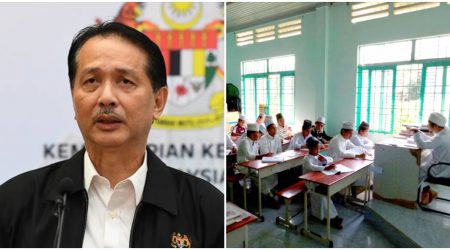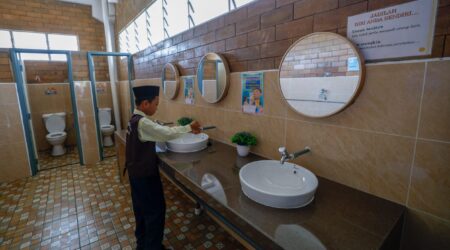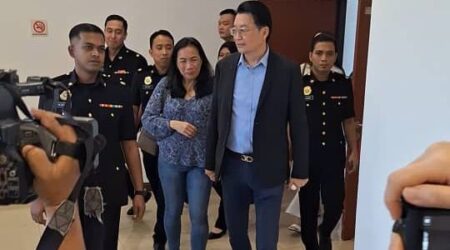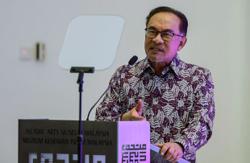Slight hiccups in Penang
GEORGE TOWN: Even before polling day, Pakatan Harapan and its ally Barisan Nasional knew Penang was theirs.
At the launch of their unity manifesto two days after nomination, Penang PKR vice-chairman Goh Choon Aik predicted they would secure 26 out of the 40 state seats.
As polling day drew closer, Chief Minister Chow Kon Yeow believed that the unity pact was nearing its goal of winning 30 constituencies.
In the end, it won 29 seats, just one short of Chow’s target.
Pakatan-Barisan knew the real battle would be the 15 seats in Penang’s Malay heartland.
In the 15th General Election nine months ago, Perikatan’s influence was largely confined to the parliamentary areas of Permatang Pauh, Tasek Gelugor, Kepala Batas and Nibong Tebal.
This time, Perikatan’s tentacles reached the Malay bastion of the island, Balik Pulau.
Two seats, Pulau Betong and Telok Bahang, went to PAS and Bersatu respectively.
Of the 15 Malay-majority seats, Perikatan took 11.
PAS emerged as the biggest winner with seven seats in the bag. Besides Pulau Betong, it won Penaga, Pinang Tunggal, Permatang Berangan, Sungai Dua, Permatang Pasir and Sungai Bakap on the mainland.
Its partner Bersatu fared well, too, as apart from Telok Bahang on the island, it took Penanti, Telok Ayer Tawar and Seberang Jaya.
The remaining four Malay-majority seats went to Barisan (Bertam and Sungai Acheh), Amanah (Bayan Lepas) and PKR (Batu Maung).
In politics, one plus one rarely equals two.
If the voting patterns of GE14 and GE15 were a factor, the unity pact would have done extremely well in this state polls with their combined votes.
But it seemed party supporters did not toe the party line, judging from the election results.
Clarion calls by party leaders that went something like “vote Pakatan if there is no Barisan” and vice versa did not ring in their heads.
PKR ended up the biggest loser, undoing its 100% winning record in the 2018 state election.
This time, it won seven out of the 13 seats contested.
It failed to turn the tide in Permatang Pauh, once a fortress of Prime Minister Datuk Seri Anwar Ibrahim. All the state seats there – Penanti, Seberang Jaya and Permatang Pasir – fell to Perikatan.
DAP kept its 100% record of winning all 19 seats it contested since 2008, but the party’s campaign was not without blemish.
Former Penang deputy chief Minister II Dr P. Ramasamy was among several Indian leaders who quit the party just days before polling.
Then there were M. Satees and David Marshel who were unhappy about DAP’s allegedly being under the control of certain individuals.
In the end, the pair of ex-DAP members saw their hopes crumble as voters stayed firmly with Pakatan.
In the Chinese-majority and mixed seats – 10 on the mainland and 15 on the island – the writing was already on the wall right after the first week of campaigning.
DAP and PKR candidates went on the offensive in their campaigns soon after nomination day.
They went on walkabouts, house-to-house visits and ceramah and were attuned to battles in the social media.
As for Perikatan candidates, nearly all of them had a tough time in Chinese-majority and mixed seats.
Among others, they were up against a well-oiled election machinery that was assembled since 2008.
For voters in such seats, “who else if not Pakatan” was the only wave.
In every ceramah, voters in the mixed and Chinese-majority seats embraced the calls for moderation, pluralism, high-income jobs and political stability.
Although some Pakatan candidates were first-timers, they were not entirely new to the voters as they had been serving the community as city councillors or in the service centres of the constituencies.
In contrast, Perikatan fielded many unknown candidates.
While some of them had been active in politics in the 90s, they are strangers to the new generation of voters.
The current ratio of 29:11 between Pakatan-Barisan and Perikatan replicates the state assembly composition in 2008.
Then, it was 29 Pakatan Rakyat assemblymen against 11 Umno assemblymen.
With all the coalitions expected to start on a clean slate come GE16, perhaps it is time for aspiring candidates from non-Pakatan parties like Gerakan to start doing their groundwork.
Otherwise, it’ll be another uphill battle against Penang Pakatan next round.













Leave a Reply